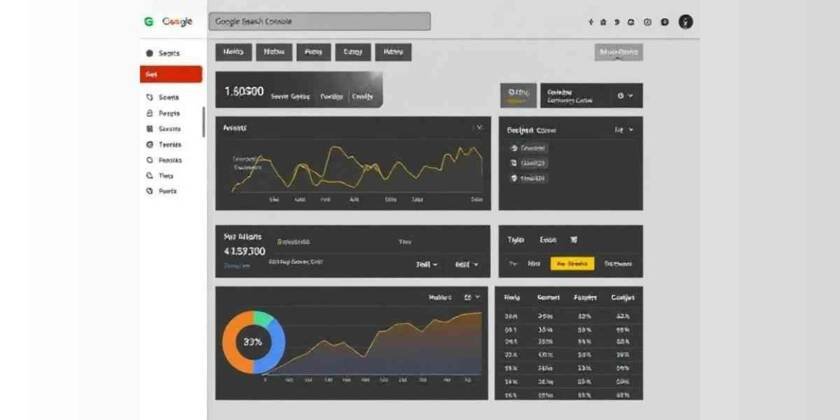In today’s digital landscape, having a well-optimized website is crucial for visibility and success. Whether you’re launching a business site, a blog, or an e-commerce store, SEO (Search Engine Optimization) is the key to driving organic traffic and ranking higher on search engines like Google. This guide will walk you through the essential SEO best practices to set up your new website for success.
Foundational SEO (Before Launch)

Keyword Research
- Understanding what your audience is searching for is crucial.
- Use tools like Google Keyword Planner, Ahrefs Free Keyword Generator, and Semrush.
- Target a mix of short-tail, long-tail, and branded keywords.
- Choose keywords with reasonable search volume and low-to-medium competition.
Website Structure
- Clear Navigation: A logical structure helps users and search engines navigate efficiently.
- URL Structure: Use short, keyword-rich, and descriptive URLs.
- Internal Linking: Enhances user experience and distributes link equity across pages.
- Mobile-Friendliness: Ensure responsive design and test with Google’s Mobile-Friendly Test tool.
- Site Speed: Optimize loading times using PageSpeed Insights, GTmetrix, and caching techniques.
- HTTPS Security: Secure your website with an SSL certificate for better rankings and trustworthiness.
Content Planning
- Map target keywords to specific pages.
- Build content pillars around broad topics.
- Develop a content calendar for consistent posting.
On-Page Optimization (The Content Itself)

Title Tags
- Critical ranking factor.
- Best format: Primary Keyword | Secondary Keyword | Brand Name.
- Keep within 50-60 characters.
Meta Descriptions
- While not a ranking factor, they impact click-through rate (CTR).
- Keep it under 160 characters and include a CTA.
Header Tags (H1-H6)
- Use only one H1 per page.
- Break down content using H2, H3, and H4 for readability and keyword inclusion.
Content Optimization
- Keyword Integration: Place keywords naturally in headings, the introduction, and throughout the content.
- Content Length: Aim for comprehensive, long-form content (1000+ words) for in-depth coverage.
- User Experience: Focus on high-quality, engaging content that satisfies search intent.
- Image Optimization: Use descriptive alt text and compressed images to enhance performance.
Schema Markup (Optional but Recommended)
- Helps search engines understand your content.
- Examples: Article, Product, Local Business schema.
Off-Page SEO (Building Authority)

Link Building
- Backlinks are a major ranking factor.
- Focus on ethical strategies: guest blogging, broken link building, and creating shareable content.
Local SEO (If Applicable)
- Claim and optimize your Google My Business listing.
- Submit business details to relevant directories.
- Encourage customer reviews for credibility.
Social Media
- Though not a direct ranking factor, it boosts brand awareness and traffic.
- Share valuable content and engage with your audience.
Technical SEO (The Backend)

XML Sitemap
- Helps search engines crawl and index your site effectively.
- Submit your sitemap to Google Search Console.
Robots.txt
- Controls which pages search engines can crawl.
- Prevents indexing of irrelevant pages (e.g., admin pages, duplicate content).
Canonicalization
- Avoid duplicate content issues by setting canonical URLs.
Tracking and Analysis

Google Analytics
- Track website traffic and user behavior.
Google Search Console
- Monitor performance, crawl errors, and indexing issues.
- Submit sitemaps and check for mobile usability.
Rank Tracking
- Use tools like Ahrefs, Semrush, or Moz to track keyword rankings.
Important Considerations
- SEO is a long-term strategy: Results take time, so consistency is key.
- Avoid Black Hat SEO: Unethical practices can lead to Google penalties.
- Stay Updated: SEO evolves; keep learning and adapting.
Conclusion
SEO is an ongoing process that requires continuous optimization and adaptation. By following these best practices, new websites can build a strong foundation for long-term success in search rankings.
Want expert SEO services? Contact us at IxD Hub through WhatsApp for tailored SEO strategies that drive results!
FAQs
1. How long does it take for SEO to show results?
SEO results typically take 3-6 months, depending on competition and optimization efforts.
2. Is SEO only about keywords?
No! SEO includes content quality, technical optimization, backlinks, and user experience.
3. Can I do SEO on my own, or do I need an expert?
Beginners can start with basic SEO, but for advanced strategies, hiring an SEO expert is recommended.




